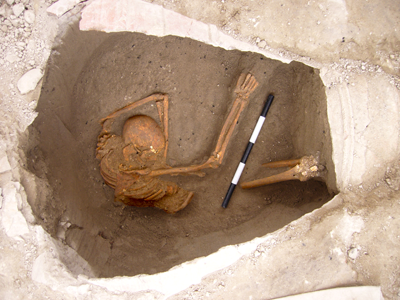Present-day Lebanese descend from Biblical Canaanites, genetic study suggests

The Near East is often described as the cradle of civilisation. The Bronze Age Canaanites, later known as the Phoenicians, introduced many aspects of society that we know today – they created the first alphabet, established colonies throughout the Mediterranean and were mentioned several times in the Bible.
However, historical records of the Canaanites are limited. They were mentioned in ancient Greek and Egyptian texts, and the Bible which reports widespread destruction of Canaanite settlements and annihilation of the communities. Experts have long debated who the Canaanites were genetically, what happened to them, who their ancestors were and if they had any descendants today.
In the first study of its kind, scientists have uncovered the genetics of the Canaanite people and a firm link with people living in Lebanon today. The team discovered that more than 90 per cent of present-day Lebanese ancestry is likely to be from the Canaanites, with an additional small proportion of ancestry coming from a different Eurasian population. Researchers estimate that new Eurasian people mixed with the Canaanite population about 2,200 to 3,800 years ago at a time when there were many conquests of the region from outside.
The analysis of ancient DNA also revealed that the Canaanites themselves were a mixture of local people who settled in farming villages during the Neolithic period and eastern migrants who arrived in the area around 5,000 years ago.
In the study, researchers sequenced whole genomes of five Canaanite individuals who lived 4,000 years ago in a city known as Sidon in present-day Lebanon. Scientists also sequenced the genomes of 99 present-day Lebanese and analysed the genetic relationship between the ancient Canaanites and modern Lebanese.
“It was a pleasant surprise to be able to extract and analyse DNA from 4,000-year-old human remains found in a hot environment, which is not known for preserving DNA well. We overcame this challenge by taking samples from the petrous bone in the skull, which is a very tough bone with a high density of ancient DNA. This method of extraction combined with the lowering costs of whole genome sequencing made this study possible.”
Dr Marc Haber First author from the Wellcome Trust Sanger Institute
“For the first time we have genetic evidence for substantial continuity in the region, from the Bronze Age Canaanite population through to the present day. These results agree with the continuity seen by archaeologists. Collaborations between archaeologists and geneticists greatly enrich both fields of study and can answer questions about ancestry in ways that experts in neither field can answer alone.”
Dr Claude Doumet-Serhal Co-author and Director of the Sidon excavation site* in Lebanon
“Genetic studies using ancient DNA can expand our understanding of history, and answer questions about the likely origins and descendants of enigmatic populations like the Canaanites, who left few written records themselves. Now we would like to investigate the earlier and later genetic history of the Near East, and how it relates to the surrounding regions.”
Dr Chris Tyler-Smith Lead author from the Wellcome Trust Sanger Institute
More information
Funding
This work was supported by Wellcome (grant 098051).
Publications:
Selected websites
The American Journal of Human Genetics
The American Journal of Human Genetics (@AJHGNews), published by Cell Press for the American Society of Human Genetics, is a monthly journal that provides a record of research and review relating to heredity in humans and to the application of genetic principles in medicine and public policy, as well as in related areas of molecular and cell biology.
The Wellcome Trust Sanger Institute
The Wellcome Trust Sanger Institute is one of the world's leading genome centres. Through its ability to conduct research at scale, it is able to engage in bold and long-term exploratory projects that are designed to influence and empower medical science globally. Institute research findings, generated through its own research programmes and through its leading role in international consortia, are being used to develop new diagnostics and treatments for human disease.
Wellcome
Wellcome exists to improve health for everyone by helping great ideas to thrive. We’re a global charitable foundation, both politically and financially independent. We support scientists and researchers, take on big problems, fuel imaginations and spark debate.


